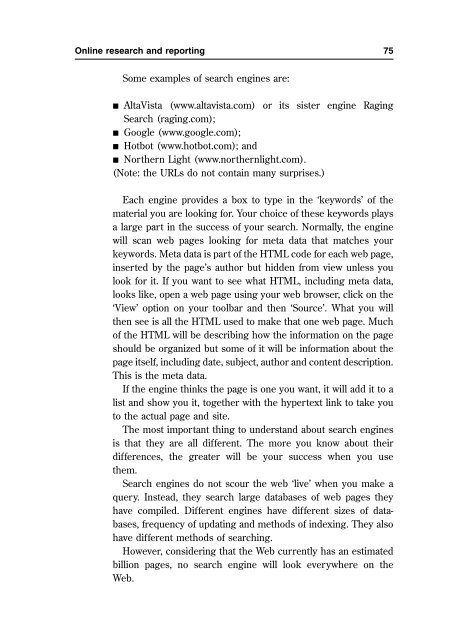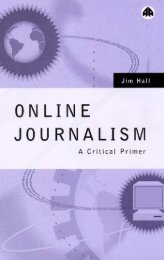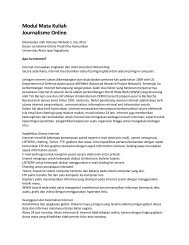1What is online journalism? - Ayo Menulis FISIP UAJY
1What is online journalism? - Ayo Menulis FISIP UAJY
1What is online journalism? - Ayo Menulis FISIP UAJY
Create successful ePaper yourself
Turn your PDF publications into a flip-book with our unique Google optimized e-Paper software.
Online research and reporting 75<br />
Some examples of search engines are:<br />
AltaV<strong>is</strong>ta (www.altav<strong>is</strong>ta.com) or its s<strong>is</strong>ter engine Raging<br />
Search (raging.com);<br />
Google (www.google.com);<br />
Hotbot (www.hotbot.com); and<br />
Northern Light (www.northernlight.com).<br />
(Note: the URLs do not contain many surpr<strong>is</strong>es.)<br />
Each engine provides a box to type in the ‘keywords’ of the<br />
material you are looking for. Your choice of these keywords plays<br />
a large part in the success of your search. Normally, the engine<br />
will scan web pages looking for meta data that matches your<br />
keywords. Meta data <strong>is</strong> part of the HTML code for each web page,<br />
inserted by the page’s author but hidden from view unless you<br />
look for it. If you want to see what HTML, including meta data,<br />
looks like, open a web page using your web browser, click on the<br />
‘View’ option on your toolbar and then ‘Source’. What you will<br />
then see <strong>is</strong> all the HTML used to make that one web page. Much<br />
of the HTML will be describing how the information on the page<br />
should be organized but some of it will be information about the<br />
page itself, including date, subject, author and content description.<br />
Th<strong>is</strong> <strong>is</strong> the meta data.<br />
If the engine thinks the page <strong>is</strong> one you want, it will add it to a<br />
l<strong>is</strong>t and show you it, together with the hypertext link to take you<br />
to the actual page and site.<br />
The most important thing to understand about search engines<br />
<strong>is</strong> that they are all different. The more you know about their<br />
differences, the greater will be your success when you use<br />
them.<br />
Search engines do not scour the web ‘live’ when you make a<br />
query. Instead, they search large databases of web pages they<br />
have compiled. Different engines have different sizes of databases,<br />
frequency of updating and methods of indexing. They also<br />
have different methods of searching.<br />
However, considering that the Web currently has an estimated<br />
billion pages, no search engine will look everywhere on the<br />
Web.
















